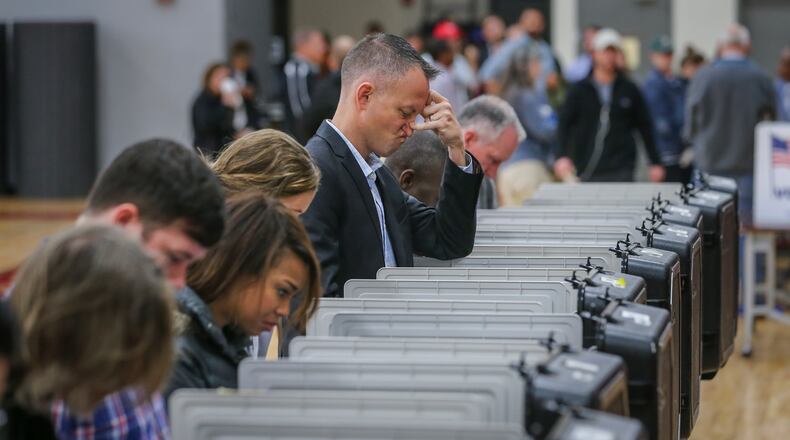Georgia’s outdated and unverifiable electronic voting machines will likely be replaced next year with paper ballots. But lawmakers and voters are debating what kind of paper-based voting system will deliver the most accurate and trustworthy results.
Once considered cutting-edge, the state’s 16-year-old electronic voting machines have come under fire because there’s no way to ensure they’re producing accurate outcomes. They lack an independent paper record that could check results stored on computers.
The machines, put into service after contentious recounts in Florida during the 2000 presidential election, pose a "concrete risk" to the state's elections, a federal judge ruled in September.
Election results could be hacked if someone gained access to voting machines or government election computers, according to testimony from computing experts. Some voters reported that the machines flipped their votes from one candidate to another in November's election for governor. And there were low vote totals in the lieutenant governor's race, which a lawsuit blames on the voting machines.
State lawmakers broadly agree that it's time to replace Georgia's 27,000 direct-recording electronic voting machines with a system that leaves a verifiable paper trail.
With a paper ballot, recounts and audits could verify the accuracy of electronic tabulations.
But there's disagreement about what kind of paper-based voting system Georgia should use and how much taxpayer money to spend on it.
Paper options
The Georgia General Assembly will decide between two types of voting systems during its annual legislative session that begins in January.
One option calls for voters to complete paper ballots by hand, filling in bubbles with a pen and then inserting their ballots into optical scanners for tabulation.
Under another type of system, voters would choose their candidates on touchscreens — similar to those currently in use across the state — and then machines would print paper ballots reflecting their selections. Voters could then review their ballots and insert them into optical scanners.
Roughly 70 percent of voters across the United States already use a paper ballot, according to Verified Voting, a Philadelphia-based election integrity organization. Georgia is one of four states that relies entirely on electronic voting machines without a verifiable paper trail, along with Delaware, Louisiana and South Carolina.
Supporters of each system say theirs is the one that will guarantee accurate results that voters can trust.
Many election integrity advocates favor hand-marked paper ballots, saying they most closely reflect voters’ intentions. Election officials would be able to review how voters filled out their ballots, and they wouldn’t have to trust that a computer printed out their choices correctly.
Some county and state election officials prefer ballot-marking devices, which are more familiar to Georgia voters who are accustomed to casting their ballots on touchscreens. Ballot-marking devices can accommodate the disabled and elderly by adjusting type size or providing audio, and they help avoid mismarked ballots by preventing voters from circling candidates’ names or scratching out their choices.
There’s also a third potential option. Georgia could switch to hand-marked paper ballots and also provide at least one ballot-marking device at each precinct to accommodate the disabled.
Money and politics
Replacing the state’s voting machines won’t be cheap.
It could cost the public about $30 million to move Georgia to hand-marked paper ballots and over $100 million for ballot-marking devices. The General Assembly will have to appropriate money from the state budget to buy voting equipment and distribute it to each of the state’s 159 counties, which manage elections. It cost $54 million for Georgia to buy direct-recording electronic voting machines before they were implemented in 2002.
Incoming Republican Secretary of State Brad Raffensperger said before his election that he likes ballot-marking devices, but he said during a government meeting on voting machines this month that he has “no predetermined outcome” in mind as state officials review new election systems. As secretary of state, Raffensperger will be responsible for managing implementation of voting machines.
The state’s incumbent voting machine vendor, Election Systems & Software, also is pushing ballot-marking devices.
Five out of six companies that showed their products to the state this fall, including ES&S, demonstrated ballot-marking devices. One company pitched hand-marked paper ballots.
Security and usability
Critics of ballot-marking devices, including computer scientists, fear that their reliance on technology could open the election system to manipulation.
They say voters wouldn’t necessarily check their printed ballot to ensure they match choices made on the touchscreens. And machine-printed ballots usually include bar codes that would be read by optical scanning computers, creating a potential avenue for voters’ printed choices to be overridden by computer-encoded language.
But hand-marked paper ballots also have flaws.
Voters in Georgia, who are accustomed to using their fingers to pick candidates on touchscreens, could easily fill out ballots incorrectly. Crossed-out candidates, stray marks, incomplete ballots and computer scanning errors could result in votes being discarded.
A decision on a voting system will likely be made quickly.
The General Assembly could vote on legislation and spending for paper ballots before it adjourns this spring. Then test runs could be held for municipal elections in fall 2019, and paper ballots could be implemented statewide in time for the March 2020 presidential primary election.
About the Author
Keep Reading
The Latest
Featured






